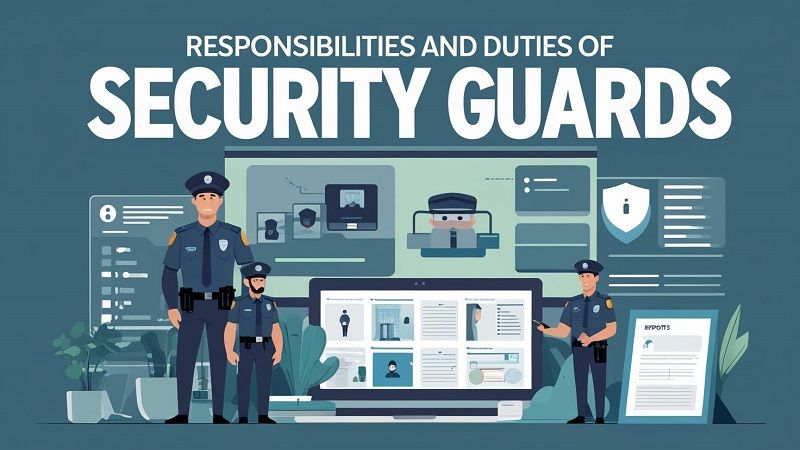Security Guards Job Description: Everything You Should Know Concerning Duties and Qualifications
Being a security guard can be a good career option. Most individuals do not understand the level of responsibility attached to the work. Security guards do a lot more than simply stand and watch.
The job market for security professionals keeps growing. More businesses want protection for their employees and customers. This creates plenty of Security Guard job Vacancies across different industries.

Daily Life of a Security Guard
Security guards start their shifts by checking equipment and reviewing reports. They walk through their assigned areas looking for anything unusual. Some guards sit at desks monitoring camera feeds all day.
The job varies depending on the location you're assigned. Hospital guards must handle medical emergencies and angry families. Mall security works with shoplifters and keeps teens from getting into mischief. Office building guards primarily check ID and sign people in.
Night work is generally less busy but involves more vigilance. Guards may be the only one who's awake in a whole complex. They have to remain sharp even if nothing is happening for hours.
Weekends and holiday work is typical in this line of work. Perpetrators don't get days off, so neither do security guards. This is a good schedule for those who need weekday time off.
Main Security Guards Responsibilities
Observing and Patrolling
- Guards have most of their time spent observing what's going on around them. They see things other people don't notice. A good guard can anticipate trouble before it arises.
- Foot patrols occur every hour or two in most locations. Guards inspect doors, windows, and equipment on their rounds. They search for evidence of damage or attempted break-ins.
- Composing reports consumes more time than people realize. Guards write down everything they observe and do. The reports assist in solving crime and preventing issues in the future.
- Camera monitoring entails patience and vigilance. Guards monitor several screens with different locations. They learn to recognize suspicious activity on video monitors.
Controlling Access
- Daily ID checks and visitor badges are a common task. Guards ensure individuals are where they need to be. They deny access to anyone without proper authorization.
- Fancy electronic systems are employed for access control by some buildings. Keycards, fingerprint readers, and other technology are learned by guards to operate. During breakdowns, they resort to manual processes.
- Regular escorting of visitors is done in secure sites. Guards accompany contractors, delivery personnel, and other visitors. It avoids unwanted entry into restricted spaces.
- Emergency lockdown protocols are no laughing matter. Guards are well-trained to know what to do when alarms ring. They regulate who gets in or out when there is a crisis.
Dealing with Emergencies
- Medical crises occur more than most people imagine. Guards administer CPR and simple first aid until the paramedics take over. They remain cool heads when assisting sick or injured individuals.
- Fire safety is a significant duty of building security. Guards are familiar with evacuation procedures and assembly sites. They assist individuals to evacuate safely in case of fires.
- Criminal activity demands rapid thinking and appropriate reaction. Guards determine whether to approach suspects or call the police. They collect evidence and witness statements when crimes are committed.
- Natural disaster and weather emergencies require special protocols. Guards assist with coordinating building evacuations and emergency broadcasts. They tend to work overtime during major weather incidents.
Education and Training Requirements
- The majority of security positions necessitate a high school diploma at a minimum. Some companies prefer applicants with college coursework in criminal justice. Military veterans tend to have an advantage because of the training and discipline.
- State licensing is required for security guards in most locations. Licensing involves background checks and fingerprinting. Classroom training prior to issuing licenses is required by some states.
- Armed security jobs have very strict requirements. Guards have to undergo firearms training and pass shooting tests. They require clean criminal records as well as mental health checks.
- On-the-job training differs with employer and setting. New guards are taught particular procedures for their respective locations. Training ranges from radio procedure to emergency response.
Physical and Mental Demands
- Security jobs demand reasonable physical fitness. Guards walk miles and stand for hours. Guards must be quick in the event of an emergency.
- Mental acuity is equally as valuable as physical prowess. Guards receive a lot of information and remain vigilant. They make critical decisions under stress.
- Handling tough people is part of the job. Guards deal with irate customers, disoriented visitors, and would-be criminals. Effective communication skills diffuse tense situations.
- Working alone is typical for security jobs. Guards may have entire shifts with no visibility of coworkers. This independence is attractive to certain people but irritating to others.
Vital Competencies and Attributes
- The first thing in security guard duties is honesty. Employers require individuals they can totally trust. Guards have entry to buildings, knowledge, and precious property.
- Observation skills distinguish better guards from mediocre ones. Top-notch guards pick up on little details and subtle variations in routine. They catch issues before they arise as large problems.
- Report writing skill enables guards to write up incidents correctly. Precise, easy-to-understand reports aid investigations and courtroom cases. Most guards have difficulty with this paperwork component of the job.
- Customer service skills are more important than people know. On a daily basis, guards handle employees, visitors and the population. The polite way of conducting or speaking is professional and will appear good.
Effective opportunities and development in a Career
- Starting positions in security are excellent foundations for career development. Seasoned guards can serve as supervisors or trainers. Some open their security firms after they have learned the business.
- Advanced security positions pay more and provide improved benefits. Airport security, government buildings, and corporate centers require experienced personnel. Advanced positions involve more training and background clearances.
- Police departments hire seasoned security guards on a regular basis. The skills cross over well to police and corrections work. Security experience serves as a stepping-stone for many guards to other law enforcement positions.
- Private investigation work appeals to some security professionals. Observation and report writing skills directly transfer to investigation cases. Some guards get licensed private investigators while maintaining security employment.
Other Types of Security Work
Retail Security
Retail security focuses on preventing theft and customer protection. The guards keep shoplifters under check and handle disturbance. This type of work involves a lot of walking and people contact.
Corporate Security
Corporate security guards office buildings and business operations. Access is controlled by guards, who watch over alarms and respond to emergencies. The work atmosphere is typically professional and subdued.
Healthcare Security
Healthcare security demands special patience and training. Hospital guards must handle medical emergencies and upset families. Security must be balanced with concerns about patient care.
School Security
Schools employ guards for safety on campus. School security is accompanied by various issues such as crowd management and student discipline. Guards coordinate their efforts with local police and school administrators.
Getting Security Guard Jobs
- Internet job boards and career websites post numerous Security Guards Job Vacancies. Newspapers at the local level still publish security job postings. Word of mouth assists seasoned guards to secure superior jobs.
- Security firms always want trusty guards. These organizations take care of training and licensing needs. They deploy guards at various clients' sites depending on experience and expertise.
- Direct hire with companies provides greater stability. Large firms usually have security departments. Government agencies offer great benefits and job security.
- Networking assists security professionals in locating advancement opportunities. Professional associations provide training and job placement services. Seasoned guards may assist newcomers to secure their first jobs.
When Businesses Hire Security Guards
- Businesses consider Hiring Security Guards due to many reasons. Increased crime rates in their locality may lead them to take such a step. Insurance firms sometimes insist on security as a precondition of coverage.
- Stores employ guards to minimize shoplifting loss. Having visible security discourages most would-be thieves. Guards assist with customer service and crowd management as well.
- Office buildings require security to secure tenant safety and property security. Guards manage access and watch common areas. They give workers and visitors peace of mind.
- Special events call for temporary security personnel. Concerts, festivals, and conventions require crowd control and safety observation. These temporary jobs provide variety and decent compensation.
Conclusion
The Security Guards Job Description contains numerous various duties and obligations. Guards protect individuals and property and ensure order is maintained. The job can be difficult but provides stable work and opportunities for advancement.
Knowledge of Security Guards Responsibilities assists both employees and employers in having real expectations. The work entails far more than simply standing around and observing. Effective guards utilize their abilities to avoid issues and protect individuals.
Meeting Security Guards Requirements takes hard work and dedication. Accurate training and licensing are the keys to success. Spending money on education and skill acquisition is rewarded with improved career opportunities and increased salaries.








ADD COMMENT